After the approval for 16 cryptocurrency exchanges, Japan’s financial regulator finally decided to reject an application of crypto exchange for the first time. The applicant is an exchange that has been postponed twice from carrying out several crypto activities and acquired two business improvement orders.
According to reports, the Japanese Financial Services Agency (FSA) is getting ready to reject an application that will operate in the country’s crypto exchange. It is concluded that Yokohama-based FSHO lacks important systems for the operation of the business. Excluding an exchange operator that is substandard, the agency hopes to prove its determination in reestablishing a sound and more effective currency trading environment in Japan.
FSHO is considered as the country’s ‘quasi-operator’ or ‘deemed dealer’ in cryptocurrencies. The country has a total of 16 deemed dealers. But, the agency revealed that 8 of them have indicated that they will withdraw their applications.
As of now, Japan has a total of 16 fully-licensed cryptocurrency exchanges, and around 100 companies are aiming to enter the space like Coinbase, Yahoo! Japan and Line Corp. Aside from Coincheck that was hacked last January, FSHO is the only other crypto exchange in the country that have received two punishment orders from FSA. The first punishment was on March 8 and the second was last April 6.
In March’s punishment order, the agency postponed all FSHO’s cryptocurrency businesses between March 8 and April 7. They also issued a business improvement order with the company. The firm was required to correct four areas of their operations like to” Build a position to manage user information securely.” The improved measures were submitted to the agency by March 22.
On the other hand, in the April Order, the agency has suspended all cryptocurrency operations of the company from April 8 until June 7 and hand out another business improvement order. The second order involves five business improvement areas, wherein some are similar to those in the previous order. One of the new areas includes the “Establishment of an effective management system including money laundering and terrorist financing” as well as a risk management system. The company was required to report the changes to the agency last May 7.
Based on the result of the review, the FSA concluded that “the exchange did not sufficiently verify the identity of customers in transactions where crime is suspected, or in cases where customer deposits may be diverted.”
As a result, Japan denied the company’s registration and its cryptocurrency exchange operations.




